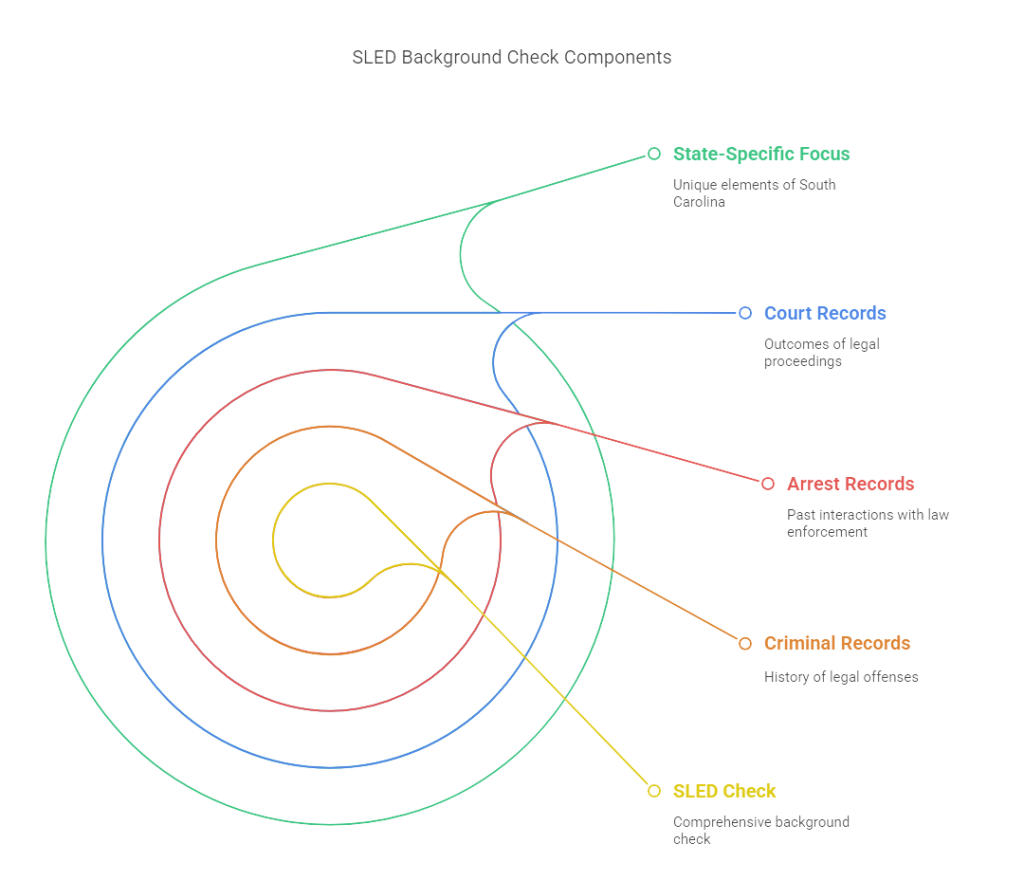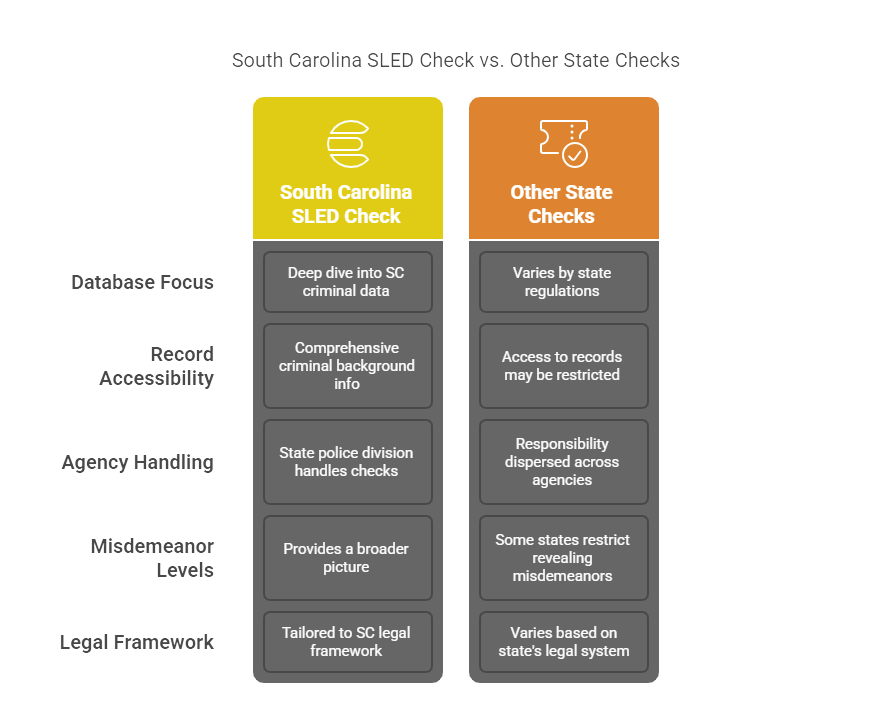Understanding what a SLED (South Carolina Law Enforcement Division) background check entails is crucial for both employers and individuals in the hiring process. Whether you're a job applicant or an HR professional looking to ensure comprehensive and compliant screenings, knowing the specifics of a SLED check can make all the difference. This guide provides a clear and concise overview of what a SLED background check includes, along with essential details that can help you confidently navigate this process.
Key Takeaways
- The South Carolina Law Enforcement Division (SLED) background checks are essential tools in ensuring informed hiring and public safety decisions in the state.
- SLED checks provide a comprehensive view of an individual's criminal history, including felonies, misdemeanors, and arrest records, within South Carolina.
- Obtaining an SLED background check involves an online application process, a manageable fee, and a brief waiting period for the detailed report.
- While SLED checks offer a more state-specific and detailed examination of legal records than some other states, they adhere strictly to privacy laws and federal guidelines to ensure compliance.
- Understanding SLED background checks and their legal requirements is crucial for employers and job applicants in South Carolina to uphold a fair and secure vetting process.
Introduction
The South Carolina Law Enforcement Division (SLED) plays a pivotal role in the state's public safety infrastructure—it runs background checks that are crucial for various purposes, especially employment. In an age where trust and security are paramount, a clear assessment of an individual's history is non-negotiable. Whether hiring a new employee or vetting a tenant, the SLED background check acts as a gatekeeper, helping you make informed decisions. Background checks shine a light on potential risks and verify credentials, setting the stage for a safer working environment. Knowing what an SLED check entails can save you from the pitfalls of oversight and significantly impact the hiring process in South Carolina.
EXPERT INSIGHT: We come to a place in every recruitment process where we dig deeper than names on a resume and jobs in a title to seek understanding, responsibility, and openness. As commonplace as background checks are, how much help they can provide in shaping our trust of individuals has been sorely underestimated. As a human resource leader, I have come to appreciate that these checks are not about uncovering red flags, but uncovering stories, providing context, and glimpses of growth. Every record represents a chapter in a human being's book, and our task is to read that chapter in equity, kindness, and integrity. Background screening properly executed is not a filter, but a bridge from past choices to future potential. - Charm Paz, CHRP
What Is a SLED Background Check?
A SLED background check is a screening tool used primarily within South Carolina to gather comprehensive information about an individual's legal history. Conducted by the South Carolina Law Enforcement Division, this check is pivotal for employers, landlords, and individuals looking to vet personal records. At its core, a SLED check aims to provide a detailed overview of an individual's criminal history and any legal proceedings associated with them. This includes felonies, misdemeanors, and sometimes arrests without convictions.
The scope of an SLED background check is fairly extensive. It typically encompasses local, state, and national criminal records, arrest records, and court documentation. This makes it a vital instrument in assessing a person's character and legal standing. For employers, it ensures that they make informed hiring decisions, minimizing risks associated with bringing the wrong candidate on board.
Legally, SLED checks have a solid foundation. They're governed by state regulations that mandate compliance with South Carolina laws and federal guidelines, such as the Fair Credit Reporting Act (FCRA). This ensures that the process respects privacy rights and handles information with the necessary level of care and confidentiality. Understanding these elements can demystify the process and clarify why an SLED background check is such an integral part of the vetting process in South Carolina.
SLED Check Details
When it comes to a SLED background check, criminal records are at the forefront. This means a thorough search of your history, covering everything from felonies to misdemeanors and even any charges that are currently pending. The report will paint a full picture of your concluded and ongoing legal encounters.
But it doesn't stop at criminal records. SLED checks also dip into arrest records. These records show when and why someone was arrested, regardless of whether those arrests led to charges or convictions. It's all about transparency—giving employers the heads-up on past interactions with law enforcement that might not show up in standard criminal databases.
Court records also make their way into an SLED check. These details illuminate the outcomes of any legal proceedings, sharing the nitty-gritty of judgments, dismissals, or any legal conclusions drawn by the courts. It's an all-inclusive snapshot of one's judicial journey.
Finally, what sets SLED apart is its state-centric focus. Certain elements are unique to South Carolina, such as reporting nuances and specific legislative conditions. This means while many states offer broad-brush background screens, a SLED check is deeply embedded in South Carolina's legal framework, offering comprehensive and distinctly local insights.

The Process of Obtaining a SLED Background Check
Getting your hands on a SLED background check is pretty straightforward, whether it's for personal use or for vetting potential hires. First, you'll visit the official SLED website. There's a dedicated section for background checks where you can request one online. Be ready with some basic info like the full name and date of birth of the individual being checked.
Once you're on the site, you'll fill out a form. This usually includes some identification verification to ensure all requests are legit. After you've filled in the necessary details, you're prompted to pay a fee. Typically, the cost for a SLED check is manageable, but it's good to have your payment method ready for a smooth transaction.
After submitting your request, don't expect instant results. SLED checks can take a few days to process. Patience is key here. They need time to pull accurate and comprehensive data from their records.
Finally, when you get the results, go through them carefully. You'll see entries for any criminal or arrest records they found. If something doesn't add up or needs clarification, don’t hesitate to reach out to SLED or a legal professional for help interpreting the data. This will ensure you’ve got the info you need to make informed decisions, whether you're weighing a job candidate or checking your own records for peace of mind.
South Carolina Background Check Compared to Other State Checks
Understanding the regional nuances can be insightful when navigating the landscape of background checks. SLED background checks stand apart due to South Carolina’s particular mix of state-specific regulations and accessible records.
Unique Aspects: SLED checks delve deeply into South Carolina's criminal databases, providing a thorough picture of an individual’s interactions with the state’s legal system. Unlike in some other states, where access to certain records might be restricted, SLED offers comprehensive criminal background information, making it a robust tool for employers in South Carolina. It's tailored to the state’s legal framework, which mandates detailed reporting and transparent record-keeping.
Regional Considerations: One key variance is how different states define the accessibility of specific records. In South Carolina, the state police division handles these checks, ensuring a singular focus and detailed attention to resident records. Other states might disperse this responsibility across multiple agencies, which can result in less uniformity in how the data is gathered and presented. Additionally, while some states restrict revealing certain misdemeanor levels, SLED provides a broader picture, which is invaluable in sectors requiring stringent vetting, such as education or healthcare. This regional specialization ensures that organizations in South Carolina can make decisions based on a comprehensive understanding of applicant backgrounds.

Legal Considerations and Compliance
Being aware of legal and compliance issues is essential when dealing with SLED background checks. First, privacy laws govern how background check information must be handled. Employers need to be careful about what data they collect and how they use it to prevent any privacy breaches. This involves sticking to both federal guidelines and specific South Carolina statutes.
Employers have specific obligations when conducting background checks. For starters, they should have written permission from the applicant before running the check. They must also inform the applicant if the results will influence hiring decisions. Fairness is key; if adverse action is to be taken based on the check, employers must provide the applicant with a copy of the report and a summary of their rights.
Several rights are in place for individuals undergoing an SLED background check to ensure they're treated fairly. Job applicants should know they can dispute inaccurate or incomplete information in the report. South Carolina has provisions allowing individuals to challenge the findings within their background checks, helping to ensure the process remains as transparent and error-free as possible.
Awareness of these legal facets is vital for maintaining compliance and ensuring an equitable hiring process.
Common Questions About SLED Background Checks
SLED background checks are confusing to get through, especially if you do not know what to look for and how everything works. Whether you are an employer, an applicant, or searching on your behalf, an understanding of what goes on behind an SLED background check is essential. These are answers to the most frequently asked questions to help you proceed confidently and clear-headed.
How comprehensive is a SLED background check?
A SLED background check is pretty thorough. It's like a magnifying glass on your criminal past within South Carolina. Expect a sweep through felonies, misdemeanors, and even pending charges. It's not limited just to convictions but includes arrest details too. Think of it as a comprehensive dive that's got you covered in terms of what you might need to know.
Can a SLED check reveal expunged records?
Nope, expunged records are off the table. Once a record is expunged in South Carolina, it's wiped clean for purposes of public and SLED access. This means if you've sealed away some past woes, they won't haunt you in these checks. A sigh of relief for many.
How do discrepancies get resolved?
First, don't panic. Discrepancies can pop up. If the details in your SLED report seem off, you can take steps to fix it. Start by contacting SLED directly. Be ready with documentation to back up your claims. It may take some back-and-forth, but straightening the record is totally doable. Keep calm and get your paperwork in order.
What is a SLED background check?
A SLED background check is a criminal record search conducted by the South Carolina Law Enforcement Division (SLED). It verifies an individual's criminal history within South Carolina and is often required for employment, licensing, or personal review purposes.
What does a SLED check cover in South Carolina?
A SLED check in South Carolina covers criminal history information, including arrest records, convictions, and court rulings within the state. It provides details about felonies and misdemeanors but does not typically include federal or out-of-state criminal records.
How do you obtain a SLED background check?
To obtain a SLED background check, visit the SLED Citizen Access website and follow the prompts to request a background check. You'll need information like the subject's full name and date of birth and must pay a processing fee, usually via credit card.
How long does a SLED background check take?
A SLED background check is usually processed instantly online; however, some requests may take longer based on the completeness of the information provided or the volume of requests SLED is handling at the time.
Is a SLED background check required for employment in South Carolina?
Not all jobs require a SLED background check in South Carolina, but many employers conduct them as part of their hiring process, especially for positions involving security, trust, or vulnerable populations, like healthcare or education.
Can a SLED background check be used outside of South Carolina?
While a SLED background check provides valuable information regarding an individual's criminal history within South Carolina, its applicability outside the state varies. It may not fulfill all requirements for background checks in other states or for federal purposes. Organizations outside South Carolina may require additional background checks.
Conclusion
In wrapping up our exploration of SLED background checks, it's clear that they serve as a critical tool for informed decision-making in employment contexts. These checks provide a thorough look at an individual's criminal history and legal proceedings within South Carolina, offering key insights to both employers and applicants.
Our journey through the process and components of a SLED background check underscores its importance in ensuring workplace safety and compliance. By understanding what these checks entail, one can approach hiring decisions or job applications with confidence and clarity.
Finally, we encourage employers and job seekers alike to use these checks wisely and adhere to legal requirements. An informed approach not only bolsters responsible decision-making but also supports the creation of safer, more transparent working environments.
Resources
- Virginia Background Check Laws: A Practical Guide for HR
- Non-CDL DOT Physical and Drug Test Requirements: What You Need to Know
- How Much Does a Urine Drug Screen Cost? Factors and Pricing
- Ohio Background Check Laws: What Employers Need to Know
- Understanding Mississippi Background Check Laws for HR
- Oklahoma Background Check Laws: Ensuring Compliance in Your Business
- Missouri Background Check Laws: A Practical Guide for Businesses
- Georgia Background Check Laws: Ensuring Compliance in Your Business
- Iowa Background Check Laws: Ensuring Business Compliance
- New Jersey Employment Background Check Laws: What to Expect in 2025 (and Beyond)
- What Does a SLED Background Check Include?
- Which States Require 10-Year Background Checks?
- What Questions Can’t You Ask in a Job Interview?
- How to Conclude a Phone Interview Professionally
- How to Check If Someone Graduated College: A Step-by-Step Guide
- How Long Does It Take to Pass a Mouth Swab Drug Test?
- Best Practices for Conducting Employee Background Checks in Texas
- Do Employers Really Check College Degrees?
- Do Pre-Employment Drug Screens Test for Alcohol? What You Should Know
Still have questions?
Get in touch with our team today for a personalized demo and discover how our tailored volume pricing and packages can drive results for your business!
How useful was this page?*
Note: your comments are anonymous. We use them to improve the website. Do not include any personal details.
Visit our FCRA Compliance Tool or leave a message here if you need a response.
From the blog Explore the GCheck Content Hub

EEOC Compliance Requirements 2026: Complete Employer Guide to Fair Hiring Practices
29 Dec, 2025 • 24 min read
FCRA Compliance Guidelines 2026: Essential Requirements for Employers
29 Dec, 2025 • 26 min read
Ban the Box Laws 2026: Complete State Compliance Guide for Fair Chance Hiring
29 Dec, 2025 • 18 min readThe information provided in this article is for general informational and educational purposes only and should not be construed as legal advice or a substitute for consultation with qualified legal counsel. While we strive to ensure accuracy, employment screening laws and regulations—including but not limited to the Fair Credit Reporting Act (FCRA), Equal Employment Opportunity Commission (EEOC) guidelines, state and local ban-the-box laws, industry-specific requirements, and other applicable federal, state, and local statutes—are subject to frequent changes, varying interpretations, and jurisdiction-specific applications that may affect their implementation in your organization. Employers and screening decision-makers are solely responsible for ensuring their background check policies, procedures, and practices comply with all applicable laws and regulations relevant to their specific industry, location, and circumstances. We strongly recommend consulting with qualified employment law attorneys and compliance professionals before making hiring, tenant screening, or other decisions based on background check information.


